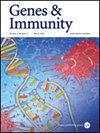The HLA-B –21 M/T dimorphism associates with disease severity in COVID-19
IF 4.5
3区 医学
Q1 GENETICS & HEREDITY
引用次数: 0
Abstract
Host genetics shape immune responses and influence severity of infectious diseases. The HLA-B –21 M/T dimorphism tunes the functionality of natural killer (NK) cells expressing the inhibitory receptor NKG2A. NKG2A+ NK cells have been reported to recognize SARS-CoV-2-infected cells, but it remains unclear whether the HLA-B –21 M/T dimorphism associates with COVID-19 severity. Here, we investigated the influence of the HLA-B –21 M/T dimorphism in a cohort of 230 unvaccinated patients hospitalized with COVID-19 and requiring respiratory support. We found that HLA-B –21 M/M genotypes were more prevalent in patients with moderate compared to severe COVID-19 (6.0% vs. 0.9%). Comparison of age- and sex-matched sub-groups revealed that patients with M/M genotypes required mechanical respiratory support less frequently (OR = 0.13, 95% CI = 0.01-0.76, P = 0.013). Furthermore, patients with M/M genotypes showed a coordinately shifted signature of clinical laboratory parameters, coinciding with elevated serum levels of the anti-viral cytokine IFN-γ. These findings demonstrate that HLA-B variants associate with COVID-19 severity and suggest that the robust functionality of NKG2A+ NK cells in patients carrying the M/M genotype may contribute to protection from severe disease.

在 COVID-19 中,HLA-B -21 M/T 二态性与疾病严重程度有关。
宿主遗传决定了免疫反应并影响传染病的严重程度。HLA-B -21 M/T 二态性调整了表达抑制性受体 NKG2A 的自然杀伤(NK)细胞的功能。据报道,NKG2A+ NK细胞能识别SARS-CoV-2感染的细胞,但HLA-B -21 M/T二态性是否与COVID-19的严重程度有关仍不清楚。在此,我们对 230 名因感染 COVID-19 而住院并需要呼吸支持的未接种疫苗的患者进行了调查,以了解 HLA-B -21 M/T 二态性的影响。我们发现,与重度 COVID-19 患者相比,HLA-B -21 M/M 基因型在中度 COVID-19 患者中更为普遍(6.0% 对 0.9%)。年龄和性别匹配亚组的比较显示,M/M 基因型患者需要机械呼吸支持的频率较低(OR = 0.13,95% CI = 0.01-0.76,P = 0.013)。此外,M/M 基因型患者的临床实验室指标也发生了协调性变化,与抗病毒细胞因子 IFN-γ 的血清水平升高相吻合。这些研究结果表明,HLA-B变异与COVID-19的严重程度有关,并表明携带M/M基因型的患者体内NKG2A+ NK细胞的强大功能可能有助于保护患者免受严重疾病的侵袭。
本文章由计算机程序翻译,如有差异,请以英文原文为准。
求助全文
约1分钟内获得全文
求助全文
来源期刊

Genes and immunity
医学-免疫学
CiteScore
8.90
自引率
4.00%
发文量
28
审稿时长
6-12 weeks
期刊介绍:
Genes & Immunity emphasizes studies investigating how genetic, genomic and functional variations affect immune cells and the immune system, and associated processes in the regulation of health and disease. It further highlights articles on the transcriptional and posttranslational control of gene products involved in signaling pathways regulating immune cells, and protective and destructive immune responses.
 求助内容:
求助内容: 应助结果提醒方式:
应助结果提醒方式:


